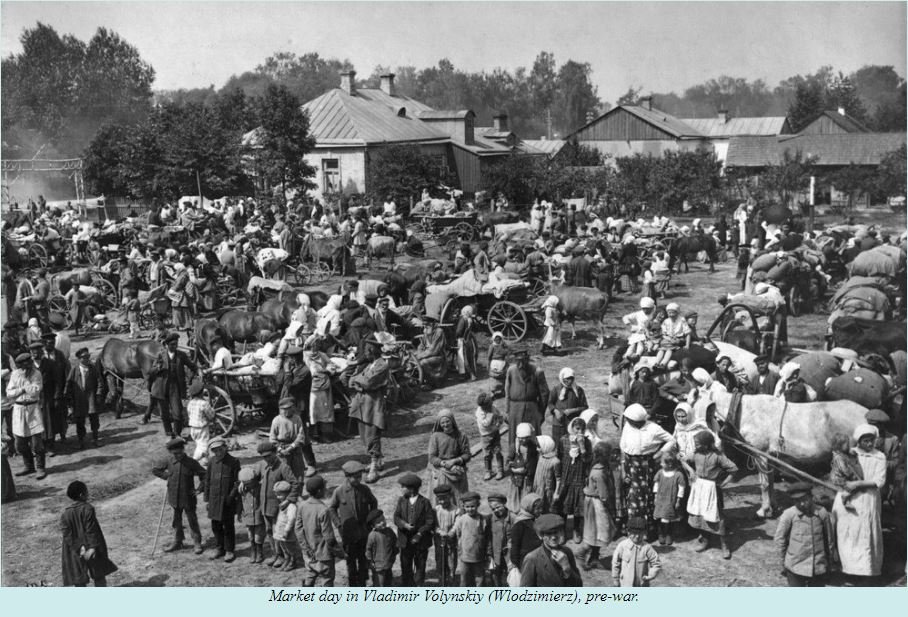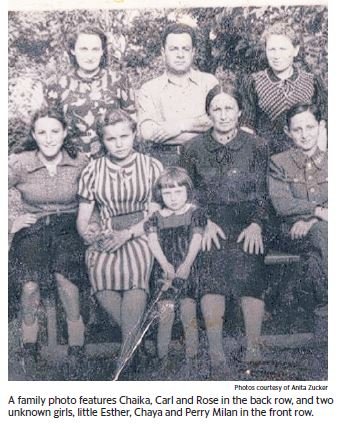Remember Jewish Ludmir / Vladimir Volynsky
Pronunciation: Lood-meer or Vladimir Vole-in-skee
HISTORY OF JEWISH LUDMIR
Volodymyr Volynskyi, called Wlodzimierz in Polish and Ludmir in Yiddish, is a city on the Luga River — a tributary of the West Bug River. It's currently located in Ukraine's Volyn oblast but was previously part of the Grand Duchy of Lithuania (in 1319), Polish-Lithuanian Commonwealth, Russian Empire (1795), and Polish republic (1921-1939). Thus, it has gone through many border changes over its history. Ludmir has been an important regional center of Volhynia since the 10th Century. First mentioned in 1171, the Jewish community of Ludmir was led during the last third of the 13th century by Rabbi Yitzak ben Mosheh, author of Or zaru'a, and Rabbi Manoaḥ ben Ya'akov. Russian chronicles mention Jews participating in the funeral of Prince Vladimir Vasil'kovich in 1289, and archaeologists have uncovered Jewish tombstones from the 14th century. In 1570, the Jews (who had returned to Ludmir after expulsion from Lithuania), together with the Christians, were exempted from paying trade duties, apart from those on salt and beeswax. Jews leased the right to collect taxes and engaged in trade and crafts, mainly in shoemaking and leather processing. Ludmir was represented on regional and national Jewish councils by, among others, Rabbi Yom Tov Lipmann Heller (rabbi from 1634 to 1643).
The Jewish quarter of Ludmir developed in the northeast part of the town, along the defensive rampart. On the eve of the Khmel'nyts'kyi uprising, approximately 1,000 Jews lived in 159 homes in Ludmir. During the uprising, Cossacks murdered or took into captivity many of the local Jews. By the end of 1649, there were only 39 Jewish homes in the town. From 1653, the community's leaders once again
began taking part in Jewish regional administration, and in 1679 and 1699 the Polish-Lithuanian kings awarded one leader of regional and crown Jewish committees, Efrayim Fishel of Ludmir, the status of royal servant. By 1662, there were 318 Jews living in the town, and the 1765 census recorded 1,327 Jews in 159 houses. When the founder of the Karliner Hasidic dynasty, Rabbi Shelomoh ha-Levi
(murdered in 1792), settled in Ludmir in 1786, the town became an important Hasidic center. The "Maiden of Ludmir," Chana Ruchla Werbermacher (1806?-1888), a local woman known for her righteousness and wisdom, also became a popular Hasidic leader. After she moved to Jerusalem in 1861, her bet midrash was occupied by the Rakhmistrov Hasidim. In 1883, the rabbis in city were Ovsey Goroditser (Horoditser), Yossi Goldfarb, and Gilariy Boguslavskiy.
BETWEEN WORLD WARS
The Jewish population of Ludmir grew due to its status as a trade and crafts center located close to the border. Some 1,849 Jews were registered in the city in 1799; they rose to 3,930 in 1847; and they reached 5,869 (about 60% of the population) in 1897. At the end of the 19th and the beginning of the 20th century, permanent charitable and medical institutions were established. After 1910, a secular school for Jews and a yeshiva functioned, in addition to Talmud Torahs. Ludmir suffered heavy damage during World War I. In 1918, however, the town was defended from pogroms by a people's militia, organized by the Austrian occupation forces and joined by about 200 Jews. During the 1920s and 1930s, Zionist organizations were the most active among the Jewish political parties. Tarbut, Beis Yakov, and ORT schools operated. Jewish periodicals were also published. In 1937, there were 11,554 Jews in Ludmir which comprised about 40% of the city's total population.
THE HOLOCAUST IN LUDMIR
Many Jews from Poland moved into Ludmir/Vladimir Volynsky by crossing the Bug River in 1939 and 1940. On June 23, 1941, the Germans bombed Vladimir Volynsky, particularly the Jewish quarter. The Jewish population suffered many losses, including the rabbi from nearby Uscilug. Two basements were burned down, killing about 550 Jews who had hidden there. On June 24, 1941, Christians looted the Jewish shops and the Nazis with the Ukrainian police kidnapped 150 Jews for forced labor. They never returned. Jewish books were handed over to the Germans per requirements broadcast on the radio stations, and they were burned.
On about 7 July, 1941, the German gabitscommisar created a Jewish council that included: Rabbi Yaakov Morgenstern (Chair), Simcha Bergman, Dr. Katz, Dr. Gregor Bubes, unknown Berman. After the rabbi died, an attorney named Weiler became chairman. After Weiler was killed for non-compliance, Bardach, a dentist, took over as head of the Judenrat. On July 31, 1941, 200 Jewish men were kidnapped by the Ukrainian police; they never returned. According to Yad Vashem, the Germans killed 15,000 Jews from the city of Wlodzimierz near the village of Piatydni, 12 kilometers west of the city, on Sept. 1-3, 1942.
On November 13, 1942, the Germans killed another 2,500 Jews from Wlodzimierz near Piatydni. In September of 1942 Germans and local policemen shot to death 3,000 Jews at the airport in Piatydni near Uscilug. Nord 365 was a Nazi concentration camp for Red Army officers located on the outskirts of Ludmir. At this locale, 56,000 POWs were shot. In November, 1941, 600 Jewish officers were herded into a shed, not permitted to eat or drink for days, and then shot at this location. An additional 100 Jewish POWs were executed on December 6, 1941 at this same location.
NAZI MURDERERS IN LUDMIR
Among the murderers responsible for the destruction of the Jewish population of Ludmir are: Friedrich Wilhelm Westerheide (Born March 17, 1908), his secretary Johanna Zelle, nee Altvater (Born August 24, 1919 in Minden), Heinrich Schone, Dr. Greinwald, Dr. Rolf Carl Hecker (Born June 6, 1910 in Leipzig), Gebietsfuhrer Eduard Grigat (Born October 9, 1897), V. Krause, Wilhelm Braune, Willibald Faust (Born April 16, 1883), Gerhard Pockrandt (Born October 3, 1910), Albrecht Boryszewski (Born June 1, 1895 in Bingen), Hermann Erichsen (Born December 29, 1906), Hans Hobert (Born February 14, 1911), Heinz Biesold (Born June 5, 1911 in Kassel), Walter Entrich, Simno Kloster, Adolf Einhorn, E. Kumming, N. Zaichuk, I. Leskovsky, S. Maksymuk, T. Sokhatsky, a German gendarmerie post staffed by Germans (between 12 and 18) and Ukrainian policemen (~100) in Ludmir, an SD (Sicherheitsdienst) unit from Rivne, a group of gendarmes from Lutsk headed by Buh, the Hauptmanschaftsfuhrer of the gendarmerie, the local gendarmerie, the Ukrainian police force, the 103rd Ukranian Police Battalion based in Matseiv (Lukiv), Turii district. A witness saw Johanna Zelle ripping a baby from its mother's arms, holding it by the legs, and smashing its head against a building.
JEWISH LUDMIR IS NO MORE
About 140 Jews returned to the city after it was liberated by the Soviets on July 22, 1944. These Jews mostly left Ludmir and went to Israel, the U.S., or elsewhere. In the 1980s, about 70 Jews lived in the city, but by 1999 there were no more than 30 Jews remaining. In 1989, a memorial was erected at the site where 18,000 Jews had been murdered, on the road to Ustylug, near the village of Piatydny.
Please review the site content below. Zachor - We Remember the victims of Ludmir.
---------------------------------------------------------------------------------------
[Surnames and Researchers] [English version of the Volodymyr Volynskyy Yizkor Book]
[Vladimir Volynsky Yizkor Book 1 (Hebrew)] [Vladimir Volynsky Yizkor Book 2 (Hebrew)]
[Remembering the Victims of the Piatidin Pogrom] [Timeline of events during the Shoah]
---------------------------------------------------------------------------------------
City of Vladimir Volynskiy:
- Book: Jewish Ludmir: A Regional History by V. Muzychenko
Majdan Tatarski Ghetto Victims (Lublin) from Vladimir Volynsky:
Samuel Fett (Lipowa 7)
China Goldman
Jankiel Kac
Idesa Kamlet
(source: Brama Grodzka - Teatr NN)
Holocaust Survivors of Vladimir Volynskiy:
Nechama Ariel
Aron Babouck
Mahla Bard
Szendla Bas
Icko Berger
Jakub Biterman
Szaja Blaj
Janek Bojarski
Pola Netel Borenstein (went to Australia)
Jankiel Borg
Dora Bork (Borg)
Icko Bodner
Gitel Bodner
Szyja Brand
Hersh Byk
Szandla Cypel
Lejb Dichter (went to Shanghai)
Hela Fisk
Rywka Fishman
Ryfka Fuks
Abram Geller
David Gerwic
Azriel Ginsberg
Leiser Gitlik
Shraga Glaz
Helena Einhorn Goldapel
Ksil Goldberg
Rose Goldberg
Jakub Goldfarb
Josef Goldfarb
David Goldfarb
Halina Goldman
Ida Goldstein
Jacob Harari
Lea Herman
Therese Hermele
Yenta Honikman
Balbina Horowicz
Regina Hunsman
Esther Szmargowicz Kac
Minasza Kac
Gerszon Kac
Szloma Kac
Judith Kaluszyner
Sara Karduner
Wolf Karduner
Ann Kazimirski
Menasha Kiper
Sylvia Korduner
Jozef Kowalski
Pinia Krawiec
Gustav Kropp
Jeffrey Lakritz
Motel Lakritz
Berko Laks
Moshe Laks (went to Sweden)
Jankiel Laks (went to Sweden)
Pinchas Laks (went to Sweden)
Szejwa Laks (went to Sweden)
Wigdor Laks (went to Sweden)
Mania Goldapel Lejfer
Josef Lesch
Mania Lichtenstein
Froim Liszner
Moshe Margalit
Liba Mendelson
Mordechai Mendelson
Haika Mibab
Peretz Mibab
Aizik Miller
Jakob Miller (went to Uruguay)
Moses Milstein
Zofia Mlezak
Moses Oks
Abraham Perelmuter
Victor Pilcz
Chaskiel Rajber
Bella Goldapel Rosenberg
Samuel Shindler
Abraham Somerschein
Icek Sprecher
Elias Stern (went to El Salvador)
Freda Stern
Genia Szajntop
Szanya Goldapel Szjantop
Estera Szek (went to Sweden)
Josef Szenker
Szulim Szpiegel
Fiszel Szmargowicz
Fiszko Szrajer
Samuel Sztajnsznajd
Mania Tisz
Jerzy Trau
Leib Uger
Abraham Wanberg
Leizer Waldman
Mina Weinrib
Fajga Weinstock
Julian Wenien
Manya Wilenczyk Gun
Rozalia Woloszyn
Hanna Zelaznik (went to Sweden)
Myroslaw Zigar
Aron Zucker (Cuker)
Haim Zucker (Cuker)
Mirla Zucker
Sara Zucker
Wadik Zucker (Cuker)
Szyja Zak
Notable People:
- Hannah Rachel Verbermacher (1805-1888), rabbi
- Bernard Zuger, psychiatrist
- Max Zuger, psychiatrist
Remember Your Family:
- The DNA Shoah Project: Connecting Descendants
- Central Judaica Database - Museum of History of Polish Jews
- Grandchildren of Holocaust Survivors on Facebook
- Guide to the YIVO Archives
- Holocaust News/Events from Generations of the Shoah Int'l
- Holocaust Survivors and Victims Database
- JewishGen Family Finder
- JewishGen Holocaust Database
- JRI-Poland: Search for Your Family
- Museum of History of Polish Jews Introduction
- Yad Vashem: Search for Your Family
- Yad Vashem: Submit Names of Your Family Members
- Yad Vashem Requests Photos of Shoah Survivors and Families
CONTACTS
U.S.: genealogykid20@aol.com
Return to Ukraine Index




